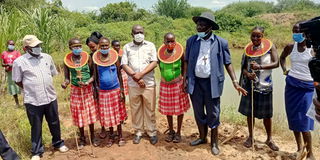How water pans have ended reliance on relief food for Tiaty residents

Christian impact mission Director Bishop Titus Masika[In suit with Pokot farmers in Lomut area West Pokot.
At dusk on her small farm in Ngo’ron village, Tiaty West sub-county, Baringo, Eveline Pkemei hums as she plucks her flourishing sukuma wiki vegetables grown in neat rows.
The store in her home is full of maize and other grains.
Ms Pkemei attributes her changing fortunes to her small dam — a water pan locally known as ‘silanka’.
The 30-year-old mother of four, who started planting crops in 2010 after a one-week training, says this could be the answer to the frequent food appeals by pastoralist communities.
“This oasis of hope has restored my smile and dignity after many years of being traumatised by hunger and thirst,” she explained.
Ms Pkemei, who makes about Sh10,000 per week from her half-acre land, is optimistic that the face of Tiaty in the next 10 years will be different because of the new farming techniques on handling drought-resistant crops.
“We want to end the habit of asking for relief food every time from the government and other organisations. The silanka has helped a lot because we have enough water. We got morale after the exposure visit,” she said.
“We came together in a group of six and dug a water pan for each person. The project has helped us during the Covid-19 pandemic as we have minimised movements,”
Under the project, “Operation Tpu Kle Out)”, farmers seek longer-lasting solutions to perennial hunger by digging small water pans and practising modern agricultural methods in the semi-arid area.
“The education I got from Yatta, where we were trained, has helped me a lot and I have benefited a lot. I’m now reaping from the silanka. We now know how to grow crops. We were in a slumber,” Ms Pkemei said.
Gideon Lenganet was the team leader of cattle rustlers who raided homesteads in Turkana and the border of Kerio Valley.
He is now among a group of 66 people rewriting their stories.
The group was taken to Yatta in Machakos County for training by Christian Impact Mission, led by Bishop Titus Masika.
In Kamanau village, Central Pokot sub-county, West Pokot, the story is the same.

Afarmer Evelyne Pkemei at her water pan in Ngoron village ,Baringo.Photo by Oscar Kakai
Farmer Samuel Losilikol, 40, is all happy with the results of the farming.
“What I have achieved is impressive, and I have never regretted diversifying into crop production,” he said.
Cattle rustlers and drought
“We have never looked back since going into irrigation farming after losing most of our animals to cattle rustlers and drought. I feel more secure after switching to crop production to supplement my income.” They are not alone.
There are many farmers in Tiaty West, Baringo, and Lomut in Pokot Central, West Pokot, in the Kerio valley who are reaping big from farming after the mindset change and transformation programme run by Christian Impact Mission.
Others involved in the programme are the National Irrigation Board (NIB), National Drought Management Authority (NDMA), Kerio Valley Authority (KVDA) and other organisations.
Through mindset change and alternative livelihoods, the small-scale farming programme has brought more than 1,000 households into transformation initiatives geared towards food, water and social and financial security and ultimately for regional security.
The chosen groups plant vegetables, maize, cassava and mangoes. They are proud that they can now see the light and forget cattle rustling.
Among the villages in Tiaty, Baringo, that have benefited from the programme in the three wards of Kibkwo, Kolowa and Tiaty are Mosolion, Maron, Ngoron, Chemlingot, Kolowa Lokadir and Chepturu.
NDMA chief executive James Odiwour, who visited Tiaty to assess the project, said it was producing impressive results.
“We are after ending the drought emergency to help residents put food on the table and money in their pocket. This will also help in peacebuilding and conflict management,” he said.
NIB representative Daniel Bundotich, on the other hand, said they had irrigated 120 small dams and are planning to set up more in the coming months.

Christian impact mission Director Bishop Titus Masika[In suit with reformed warriors at Lomut area ,West Pokot.
West Pokot Governor John Lonyangapuo said it was the ideal time for the region to engage the majority of its youth who had abandoned cattle raids and banditry.
“Peace has prevailed since last year. We are dealing with … diseases, illiteracy, insecurity, taking residents through the journey of transformation. We want to sustain peace along Turkana East-Marakwet,” he said.
He lauded the brains behind the success of the project, which he said will help bring lasting peace among communities living in the North Rift.
Bishop Masika, founder of Christian Impact Mission, said they have started a commercial village model for agribusiness.
“Cases of cattle rustling and banditry attacks have reduced thanks to varied initiatives geared towards transforming those involved,” he said.
The programme, he said, has enabled residents to have sufficient food and water.
“Water was a constant problem in the area. Because the area is semi-arid, people walked more than 20km daily in search of water,” he said.
‘We are now seeing champions and we want commercial villages where farmers should start agribusiness but not sell maize. Tiaty and Lomut will never be the same again. They have started producing high yield crops.”
KVDA managing director Sammy Naporos said the organisation had posted an extension officer in Kolowa and given out 2,000 mango tree seedlings to farmers.
“The officer is educating farmers on good agriculture. We also have a honey project and give equipment to farmers and a mango value chain at Tot,” he said.
“We aim to be the food basket of the county and entire region of North Rift and say goodbye to pangs of hunger.”





